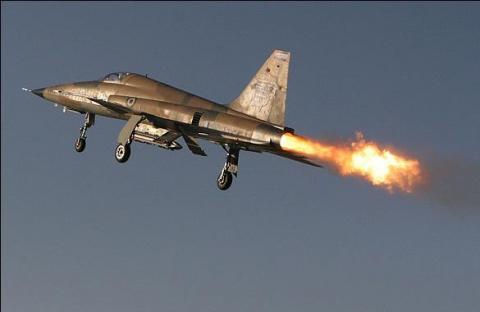Sunday 16 September 2012 - 14:52
Story Code : 5737
Iran plans military exercises in preparation for Israeli strike on nuclear facilities
Iran will stage massive manoeuvres next month in a muscle-flexing show of preparedness to combat a US or Israeli aerial bombardment on its nuclear installations.
The exercise is being showcased as the biggest air defence war game in the Islamic Republic's history and will be Iran's most visible response yet to mounting speculation that Israel's prime minister, Benjamin Netanyahu, may order a military strike this autumn.
Using surface-to-air missiles, unmanned drones and state-of-the-art radar, Iran's Revolutionary Guards and air force will combine to test the defences of 3,600 sensitive locations throughout the country, including oil refineries and uranium enrichment facilities.
"This manoeuvre is intended to assess the preparedness both of our manpower forces and air defence installations," Brigadier General Farzad Esmaili, commander of the Khatam al-Anbiya air defence base, told a conference marking Iran's annual air defence day earlier this month. "We will also identify vulnerabilities, try out new tactics and practise old ones."
The high-profile manoeuvres will represent a riposte to planned naval exercises this week by the US in the Persian Gulf. The American exercises, which focus on tackling threats from sea mines, are seen - though not officially acknowledged - as a response to Iranian threats to close or sabotage the waterways of the Strait of Hormuz, the strategically vital transit route for around one-fifth of the world's oil.
Last week, General Hossein Salami, deputy commander of the Revolutionary Guards, promised to "drag the war inside the enemies' borders" if Iran were attacked. His comments may have referred to Iran's capacity to call on the services of Hezbollah, the militant Lebanese Shiite group widely seen as Tehran's proxy, to fire rockets into Israel in the event of hostilities.
Mohsen Rezai, who led the Revolutionary Guards during the 1980-88 Iran-Iraq war and is now an influential member of Irab's powerful Expediency Council, made more explicit threats than Mr Salami.
"I have heard they [the Israeli government] have estimated that 400 to 500 people in Israel would be killed. They are wrong," he told a newspaper. "Iran's reaction would be so severe that nobody would ever dare think of attacking us again."
The targets of Iranian retribution are unlikely to be just Israeli. Hezbollah's leader, Hassan Nasrallah, told a Lebanese television station this month that the US would be held responsible for any Israeli action. "The response will not just be Iranian targets. If Israel targets Iran, America bears responsibility."
However, despite the bluster, the official Iranian assessment appears to be that an imminent attack is highly unlikely.
"It's hard to assess exactly what they think but from everything the Revolutionary Guards and the Quds Force (the elite unit tasked with operations abroad) say, I don't think they believe Israel will attack Iran," said Mohsen Sazegara, a founder member of the Revolutionary Guards now exiled in the US.
"All their statements indicate that they think Netanyahu is indulging in psychological warfare."
Indeed, with negotiations between the West and Iran over Tehran's nuclear programme at a standstill, Ayatollah Ali Khamenei, the Supreme Leader who has the final say over all state matters, appears to have calculated that he can wait until the US presidential election and possibly well beyond it before either side makes a decisive move.
Believing that President Barack Obama's hands are tied, Ayatollah Khamenei may even prefer to see Mitt Romney triumph in November's poll on the grounds that a Republican president has greater domestic scope to make concessions to Iran than a Democrat incumbent.
"Khamenei is relatively relaxed that nothing will happen before the US presidential election and so there is no sense of urgency in Iran to make a concession on the nuclear issue," said Mehdi Khalaji, senior fellow with the Washington Institute and a former seminary student in the Iranian religious city of Qom.
"He believes that although Israel is talking about war, what they actually want is to mobilise the West against Iran rather than go to war themselves. If Obama gets re-elected, Khamenei believes he won't go to war - instead he needs to come up with a new package to offer Iran.
"If Romney wins, it will take him several months to form a national security team and he then needs to try diplomacy first before going to war. That gives Iran another year."
Mr Khalaji added: "Khamenei thinks Romney winning would be great for Iran. He thinks he might be willing to comrpomise than Obama. And historically, despite their tough talk, the Republicans have always been more willing to cooperate with Iran."
Despite a catalogue of economic woes including plummeting oil revenues and a sharp decline in the value of the Iranian rial against the dollar, there is little sign that the economy is about to implode. Although President Mahmoud Ahmadinejad recently acknowledged that Western sanctions have caused difficulties, officials are trumpeting the emergence of a self-sufficient "resistance economy" that will see Iran become less reliant on its oil income.
"Economically, Iran is doing better than expected," Mr Khalaji said. "It is true that prices are going up and ordinary people are suffering, but it doesn't mean life has stopped in Iran. What we are seeing is more mismanagement rather than the impact of sanctions. In the short-term, sanctions cannot cripple the economy in a way that would force Iran to suspend uranium enrichment."
The Iran Project is not responsible for the content of quoted articles.
# Tags











